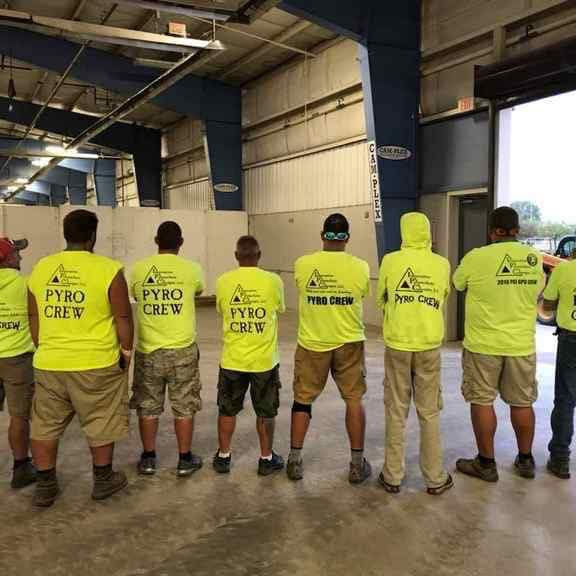15-hour Healthcare - Hospital Safety Specialist Training Course
Comprehensive 15-hour Healthcare Hospital Safety Specialist training per OSHA covering pathogens, hospital hazards, patient safety, and healthcare risks.

Course Title
15-hour Healthcare: Hospital Safety Specialist
Course Duration
2 Days
Competency Assessment Criteria
Knowledge Assessment
Training Delivery Method
Classroom (Instructor-Led) or Online (Instructor-Led)
Service Coverage
In Tamkene Training Center or On-Site: Covering Saudi Arabia (Dammam - Khobar - Dhahran - Jubail - Riyadh - Jeddah - Tabuk - Madinah - NEOM - Qassim - Makkah - Any City in Saudi Arabia) - MENA Region
Course Average Passing Rate
98%
Post Training Reporting
Post Training Report(s) + Candidate(s) Training Evaluation Forms
Certificate of Successful Completion
Certification from OSHAcademy is provided upon successful completion. The certificate can be verified through a QR-Code system or by the following link: https://app.oshacademy-atp.com/verify/
Certification Provider
OSHAcademy - USA
Certificate Validity
No Expiration (Lifetime)
Instructors Languages
English / Arabic / Urdu / Hindi / Pashto
Training Services Design Methodology
ADDIE Training Design Methodology
.png)
Course Overview
This comprehensive 15-Hour Healthcare: Hospital Safety Specialist training program provides participants with essential knowledge and practical skills required for maintaining safe and healthy work environments in hospital settings. The program is specifically tailored for healthcare professionals seeking comprehensive safety training in a hospital setting.
Participants will learn to apply OSHA standards and healthcare industry best practices to recognize and prevent hazards specific to hospital operations while understanding fundamental safety procedures. This program combines theoretical concepts with practical applications and real-world case studies to ensure participants gain valuable knowledge applicable to their professional environment while emphasizing hazard identification, patient and worker safety, and hospital-specific safety challenges. Hospitals are an essential component within the more extensive healthcare system. Although hospitals are designed to help the sick and injured, employees face various hazards when working in a hospital. This program offers a deep dive into critical OSHA training topics, including OSHA bloodborne pathogens and hospital-specific safety hazards and challenges. This program helps employers meet OSHA training requirements for their staff.
Key Learning Objectives
Understand OSHA policies, regulations, and procedures applicable to hospital settings
Recognize workers' rights and employer responsibilities under OSHA standards in healthcare
Identify common workplace hazards in hospital environments
Apply walking and working surface safety principles including slip, trip, and fall prevention
Understand exit routes, emergency action plans, and fire prevention requirements for hospitals
Apply electrical safety fundamentals and hazard recognition specific to hospital equipment
Implement Personal Protective Equipment (PPE) selection and use for hospital tasks
Understand hazard communication and chemical safety for hospital materials
Implement bloodborne pathogens exposure control measures following OSHA Bloodborne Pathogens Standard 1910.1030
Recognize and control hospital-specific safety hazards
Apply patient handling and mobility safety practices
Understand workplace violence prevention in healthcare settings
Group Exercises
N/A by OSHAcademy
Knowledge Assessment
OSHAcademy Knowledge Assessment
Course Outline
Subcourses:
Mandatory Topics:
Introduction to OSHA
Walking and Working Surfaces including Fall Protection
Exit Routes, Emergency Action Plans, and Fire Prevention
Electrical Safety
Personal Protective Equipment
Hazard Communication
Hospital-Specific Topics:
Bloodborne Pathogens in Healthcare Setting
Hospital-Specific Safety Hazards and Challenges
Patient Safety and Worker Protection
Practical Assessment
OSHAcademy Practical Assessment
Gained Core Technical Skills
Latex allergy prevention and management per 29 CFR 1910.1200 (Hazard Communication Standard), including Type I hypersensitivity reactions, protein sensitization mechanisms, alternative material selection protocols, and medical surveillance programs for at-risk healthcare personnel.
Hazardous chemical safety programs per 29 CFR 1910.1200 and 29 CFR 1910.1450 (Occupational Exposure to Hazardous Chemicals in Laboratories), including Safety Data Sheets (SDS) interpretation, chemical inventory systems, exposure control hierarchies, and spill response procedures for healthcare-specific chemicals.
Glutaraldehyde exposure control per 29 CFR 1910.1000 (Air Contaminants), including high-level disinfection procedures, engineering controls for vapor containment, personal protective equipment selection, and administrative controls for cold sterilization processes in healthcare facilities.
Mercury safety and spill management per 29 CFR 1910.1000, including mercury-free equipment conversion strategies, vapor exposure monitoring, spill containment and cleanup protocols, and proper disposal methods for mercury-containing medical devices and thermometers.
Fire safety and emergency preparedness per 29 CFR 1910.37 (Means of Egress) and 29 CFR 1910.157 (Portable Fire Extinguishers), including fire triangle principles, Class A/B/C/D/K fire extinguisher selection, evacuation planning for patient care areas, and Life Safety Code (NFPA 101) compliance in hospitals.
Biological hazard control per 29 CFR 1910.1030 (Bloodborne Pathogens), including tuberculosis exposure control per CDC guidelines, aerosol-generating procedures safety, N95 respirator fit testing, and infection prevention strategies for airborne and contact-transmitted pathogens in clinical settings.
Workplace violence prevention programs per OSHA Guidelines for Preventing Workplace Violence for Healthcare and Social Service Workers, including environmental design through Crime Prevention Through Environmental Design (CPTED), de-escalation techniques, aggressive patient management protocols, and active shooter response planning specific to healthcare facilities.
Electrical safety in patient care areas per 29 CFR 1910.303 through 1910.308 and NFPA 70 (National Electrical Code), including medical equipment grounding verification, electrical hazard recognition during wet procedures, hospital-grade receptacle requirements, and electrical safety in oxygen-enriched environments.
Personal protective equipment programs per 29 CFR 1910.132 through 29 CFR 1910.138, including hazard assessment protocols, PPE selection matrices for various hospital procedures, fit testing for respiratory protection, and decontamination procedures for reusable equipment in healthcare settings.
Radiation safety practices per 29 CFR 1910.1096 (Ionizing Radiation), including ALARA principles (As Low As Reasonably Achievable), time-distance-shielding exposure reduction strategies, radiation monitoring badge programs, and safe handling procedures for diagnostic and therapeutic radiation sources in hospitals.
Training Design Methodology
ADDIE Training Design Methodology
Targeted Audience
Hospital Safety Specialists coordinating safety programs
Hospital Safety Coordinators supporting safety initiatives
Registered Nurses and Licensed Practical Nurses
Emergency Department Staff managing acute care
Operating Room Personnel in surgical settings
Intensive Care Unit Staff managing critical patients
Medical-Surgical Unit Nurses providing inpatient care
Radiology and Imaging Technicians operating diagnostic equipment
Respiratory Therapists providing respiratory care
Physical Therapists and Occupational Therapists
Hospital Environmental Services Personnel
Hospital Maintenance and Engineering Staff
Why Choose This Course
Specialized training focusing on hospital-specific safety requirements and challenges
Comprehensive coverage of OSHA standards applicable to hospital environments
Designed specifically for hospital professionals and healthcare workers
Helps employers meet OSHA training requirements for hospital personnel
Qualifies for up to 1.5 Continuing Education Units (CEUs) for professional development
Includes critical bloodborne pathogens training required for hospital settings
Flexible learning options supporting self-paced online completion accessible from any device
Emphasizes hospital-specific hazards including patient handling and workplace violence
Comprehensive coverage of worker and patient safety in hospital environments
Access to extensive training resources including study guides, knowledge checks, and interactive scenarios
Industry-respected certification demonstrating hospital safety competence
Affordable training solution providing exceptional value for hospital safety education
Exceeds standard training with knowledge checks, activities, and open book exams
Enhances understanding of OSHA healthcare training requirements for hospitals
Lifetime access to course materials supporting ongoing reference and continuous learning
Note
Note: This course outline, including specific topics, modules, and duration, can be customized based on the specific needs and requirements of the client.
Course Outline
Subcourses:
Mandatory Topics:
Introduction to OSHA
Walking and Working Surfaces including Fall Protection
Exit Routes, Emergency Action Plans, and Fire Prevention
Electrical Safety
Personal Protective Equipment
Hazard Communication
Hospital-Specific Topics:
Bloodborne Pathogens in Healthcare Setting
Hospital-Specific Safety Hazards and Challenges
Patient Safety and Worker Protection
Why Choose This Course?
Specialized training focusing on hospital-specific safety requirements and challenges
Comprehensive coverage of OSHA standards applicable to hospital environments
Designed specifically for hospital professionals and healthcare workers
Helps employers meet OSHA training requirements for hospital personnel
Qualifies for up to 1.5 Continuing Education Units (CEUs) for professional development
Includes critical bloodborne pathogens training required for hospital settings
Flexible learning options supporting self-paced online completion accessible from any device
Emphasizes hospital-specific hazards including patient handling and workplace violence
Comprehensive coverage of worker and patient safety in hospital environments
Access to extensive training resources including study guides, knowledge checks, and interactive scenarios
Industry-respected certification demonstrating hospital safety competence
Affordable training solution providing exceptional value for hospital safety education
Exceeds standard training with knowledge checks, activities, and open book exams
Enhances understanding of OSHA healthcare training requirements for hospitals
Lifetime access to course materials supporting ongoing reference and continuous learning
Note: This course outline, including specific topics, modules, and duration, can be customized based on the specific needs and requirements of the client.
Practical Assessment
OSHAcademy Practical Assessment
Course Overview
This comprehensive 15-Hour Healthcare: Hospital Safety Specialist training program provides participants with essential knowledge and practical skills required for maintaining safe and healthy work environments in hospital settings. The program is specifically tailored for healthcare professionals seeking comprehensive safety training in a hospital setting.
Participants will learn to apply OSHA standards and healthcare industry best practices to recognize and prevent hazards specific to hospital operations while understanding fundamental safety procedures. This program combines theoretical concepts with practical applications and real-world case studies to ensure participants gain valuable knowledge applicable to their professional environment while emphasizing hazard identification, patient and worker safety, and hospital-specific safety challenges. Hospitals are an essential component within the more extensive healthcare system. Although hospitals are designed to help the sick and injured, employees face various hazards when working in a hospital. This program offers a deep dive into critical OSHA training topics, including OSHA bloodborne pathogens and hospital-specific safety hazards and challenges. This program helps employers meet OSHA training requirements for their staff.
Key Learning Objectives
Understand OSHA policies, regulations, and procedures applicable to hospital settings
Recognize workers' rights and employer responsibilities under OSHA standards in healthcare
Identify common workplace hazards in hospital environments
Apply walking and working surface safety principles including slip, trip, and fall prevention
Understand exit routes, emergency action plans, and fire prevention requirements for hospitals
Apply electrical safety fundamentals and hazard recognition specific to hospital equipment
Implement Personal Protective Equipment (PPE) selection and use for hospital tasks
Understand hazard communication and chemical safety for hospital materials
Implement bloodborne pathogens exposure control measures following OSHA Bloodborne Pathogens Standard 1910.1030
Recognize and control hospital-specific safety hazards
Apply patient handling and mobility safety practices
Understand workplace violence prevention in healthcare settings
Knowledge Assessment
OSHAcademy Knowledge Assessment
Targeted Audience
Hospital Safety Specialists coordinating safety programs
Hospital Safety Coordinators supporting safety initiatives
Registered Nurses and Licensed Practical Nurses
Emergency Department Staff managing acute care
Operating Room Personnel in surgical settings
Intensive Care Unit Staff managing critical patients
Medical-Surgical Unit Nurses providing inpatient care
Radiology and Imaging Technicians operating diagnostic equipment
Respiratory Therapists providing respiratory care
Physical Therapists and Occupational Therapists
Hospital Environmental Services Personnel
Hospital Maintenance and Engineering Staff
Main Service Location
Suggested Products
This item is connected to a text field in your database. Double click the dataset icon to add your own content.

ISO 9001 Internal Auditor
This item is connected to a text field in your database. Double click the dataset icon to add your own content.
%20-%20TTT%20Training%20Service.jpeg)
Defensive Driving (Heavy Duty) - TTT
This item is connected to a text field in your database. Double click the dataset icon to add your own content.
%20-%20TTT%20Training%20Service.jpg)
Defensive Driving (Light Vehicle) - TTT
This item is connected to a text field in your database. Double click the dataset icon to add your own content.

HSE Leadership
This item is connected to a text field in your database. Double click the dataset icon to add your own content.

Welding Safety
This item is connected to a text field in your database. Double click the dataset icon to add your own content.
%20Training%20Service.jpg)
Permit to Dangerous Work (PTDW)
This item is connected to a text field in your database. Double click the dataset icon to add your own content.

Pyrotechnic Safety Awareness
This item is connected to a text field in your database. Double click the dataset icon to add your own content.

Safe Handling of Gases
This item is connected to a text field in your database. Double click the dataset icon to add your own content.


